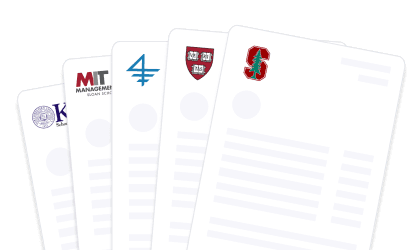
Join a free event
Learn from top coaches and industry experts in live, interactive sessions you can join for free.
Table of Contents
Are you considering applying for an MBA program at the Wharton School of the University of Pennsylvania? As one of the most prestigious institutions in the world, gaining admission to Wharton can be highly competitive. In this comprehensive guide, we will take an in-depth look at the role of letters of recommendation in the Wharton MBA application process. We will explore important questions, provide expert tips, and showcase examples of successful recommendation letters. Let's get started!
Wharton and the Role of Letters of Recommendation
At Wharton, letters of recommendation are not a box-checking exercise; they’re a critical lens into your leadership style, trajectory, and the kind of impact you’re likely to make in the classroom and beyond. Wharton is building a high-performance, high-collaboration ecosystem. They’re looking for future business leaders who combine analytical rigor with emotional intelligence, who can both drive outcomes and elevate the people around them. Your recommenders are often the most credible voices to prove that.
That’s why Wharton sticks to just two recommendations: one mandatory from your current or most recent supervisor, and one optional (which can be from a client, previous manager, or senior colleague). This simplicity puts pressure on quality; vague praise or surface-level descriptions will hold you back. Your recommenders need to demonstrate a deep, firsthand understanding of how you think, lead, grow, and collaborate. Wharton values evidence-based storytelling, i.e., anecdotes that show how you handled a tough interpersonal dynamic, took ownership under ambiguity, or coached a peer through a challenge. Letters that emphasize humility, self-awareness, and a growth mindset (not just raw output) tend to resonate most.
Wharton also expects consistency and coherence across your application. If your essays position you as an inclusive leader who values feedback, but your recommender focuses only on your technical skills and says little about collaboration, that mismatch will raise questions. The best letters reinforce your narrative and illuminate your trajectory. They do not repeat your resume, but contextualize your achievements and potential within a team and organizational setting.
Bottom line: Wharton is not just looking for achievement. They’re looking for influence, humility, and momentum. The best recommendations aren’t just glowing, they’re earned. Choose people who have seen you grow, not just people who like you. And equip them to write with depth, clarity, and conviction.
Check out these additional Wharton resources:
- Wharton MBA Essays: Prompts, Examples, and Expert Tips
- Wharton TBD Interview Guide
- Wharton MBA Application Deadlines
Wharton MBA Recommendations (2025)
Criteria
As of 2025, Wharton requires two letters of recommendations from individuals who are well-acquainted with your performance in a work setting, ideally from a current or former supervisor.
On its site, Wharton advises that: "The title or position of the recommender is not as important as their ability to comment knowledgeably and specifically about you. A detailed recommendation from a current or former supervisor, colleague, or client will provide us more insight than someone with a prestigious title like CEO."
Questions
Recommenders will be asked to choose traits that best describe the candidate from two different lists and then answer two different questions. See the official site here.
- List 1: Choose up to two traits from this list that you feel best represent the candidate you are recommending to the Wharton MBA Program. (Determined, Humble, Disciplined, Engaged, Intellectually Curious, Analytical, Flexible, Persistent, Conscientious, Results Oriented)
- List 2: Choose up to two traits from this list that you feel best represent the candidate you are recommending to the Wharton MBA Program. (Collaborative, Persuasive, Innovative, Confident, Self-Aware, Professional, Resilient, Energetic, Emotionally Stable, Agreeable)
- Question 1: Please provide example(s) that illustrate why you believe this candidate will find success in the Wharton MBA classroom. (300 words)
- Question 2: Please provide example(s) that illustrate why you believe this candidate will find success throughout their career. (300 words)
Expert Tips for Powerful Wharton Recommendation Letters
The admissions committee reads thousands of glowing letters every year. The ones that stand out don’t just praise — they reveal. They offer rich, specific insight into how you lead, grow, and show up for others in high-stakes environments. Here’s how to ensure your letters rise to the top.
1. Prioritize the depth of your relationship over prestige.
The single biggest mistake candidates make is defaulting to the most senior person they can find. At Wharton, a compelling letter from a mid-level manager who has been in the trenches with you is far more impactful than a VP who barely remembers your last name. Choose recommenders who’ve seen you solve problems, navigate ambiguity, give and receive feedback, and lead across levels.
Expert Tip: The AdCom wants proof of potential. The better a recommender knows you, and can speak to your day-to-day impact, the more likely they are to write a letter with specificity and conviction.
2. Coach, but don't script.
Your recommender needs to write the letter — not you. But that doesn’t mean you leave them blind. You can't control what they write, but you can guide them to stronger letters by giving them the context of the rest of your application and refreshing their memory with anecdotes and examples. We highly recommend providing them with a letter of rec prep doc that outlines the schools you're applying to, the traits you're highlighting in your essays, and examples of projects or milestones made with them. You can also include your short-term and long-term goals, why you're applying to certain schools, and any other information that would be helpful. You can download a free example and template for this below.

MBA Recommender Prep Doc (Template & Example)
Help your recommender write the strongest possible letters with this prep doc, used by thousands of applicants. Download for free.
3. Focus on evidence-based endorsement
Letters of recommendation (and essays) are very much a game of "show, don't tell." Your recommender should make statements about you but then they need to support those claims with real, grounded examples. And again, the more specific, the better. Think:
- How did you lead a team under pressure?
- When did you own a project beyond your scope?
- How do you elevate those around you?
- How do you handle failure, feedback, or conflict?
Vague praise will always fall flat. Make sure that your recommender understands that everything should be backed by evidence, and use your recommender prep doc to give them the content they need to succeed.
Expert Tip: Superlatives are great where possible (though they also need to be backed by evidence). Which one do you think sounds stronger:
- She was an excellent analyst.
- She was one of the best analysts I've worked with in 15 years.
The second is clearly much more impactful. Rec letters are the AdComs' third-person perspective and they want to understand how you as an applicant compare to others; superlatives make it obvious.
4. Speak to growth, not just strengths
Wharton cares about trajectory; they’re not just admitting who you are now, but who you’re becoming. The best letters highlight how you’ve evolved over time. Has your emotional intelligence deepened? Have you moved from executor to strategist? Did you stretch into a leadership role that tested you? Growth signals teachability, self-awareness, and momentum — three traits Wharton values deeply.
5. Ensure complementarity with your application
Think of your recommender as your co-narrator. The goal isn’t duplication: it’s amplification. If your essays focus on your analytical rigor, ask your recommender to emphasize your interpersonal skills. If you talk about leading cross-functional teams, have them validate your influence and followership. The most effective applications triangulate: essay, resume, and recommendations all pointing to a cohesive, dimensional story.
For Wharton-specific help on your applications, check out these Wharton MBA experts:
- Allie K.: Wharton MBA + Harvard MPP, Ex-Goldman Sachs/Boston Consulting Group, Private Equity Associate, 75+ M7 Admits
- Amy H.: Former Wharton Associate Director of Admissions, Professional MBA Admissions Coach, 20+ Years of Experience
- Arielle F.: Wharton MBA, Ex-Goldman Sachs & Warburg Pincus, 60+ Applicants Coached

Example Wharton Letter of Recommendation
- Recommender Title: Director of Strategy, North America
- Company: Global health firm
- Relationship: Direct supervisor for 2 years
- List 1 – Selected Traits: Intellectually Curious, Results Oriented
- List 2 – Selected Traits: Self-Aware, Collaborative
Question 1: Please provide example(s) that illustrate why you believe this candidate will find success in the Wharton MBA classroom. (300 words)
I’ve worked directly with [Name] for the past two years, first as a Strategy Associate and now as a Senior Associate on my team at [Company] Global Health. From the outset, [Name] distinguished herself through her intellectual curiosity and her ability to quickly synthesize complex information across domains. In our work, which is often at the intersection of healthcare, technology, and policy, ambiguity is the norm. [Name] not only navigated that ambiguity but actively thrived in it, routinely asking incisive questions that pushed our team’s thinking and raised the quality of our analysis.
One particular example stands out. We were tasked with designing a market entry strategy for a new AI diagnostic tool across three low-resource countries. The data was fragmented, the stakeholders varied, and our internal team had differing views. [Name] took the lead on developing a framework that helped us evaluate clinical viability, regulatory risk, and unit economics simultaneously. She interviewed public health officials, analyzed claims data sets from multiple ministries, and presented a decision matrix that became the foundation for our board’s final recommendation. It was both rigorous and easy to follow, exactly the kind of thinking that would thrive in a Wharton classroom.
What also makes [Name] exceptional is her classroom presence. I’ve seen her in stakeholder workshops and internal training sessions: she listens actively, asks questions that move the conversation forward, and builds on others’ ideas. She has a natural ability to engage constructively while keeping the group focused. I can easily see her elevating discussions at Wharton, not just by being smart, but by being the kind of peer others want to learn alongside.
Question 2: Please provide example(s) that illustrate why you believe this candidate will find success throughout their career. (300 words)
[Name] will succeed not just because she’s sharp and hardworking, but because she is deeply self-aware and constantly growing. I’ve watched her evolve from a strong individual contributor to someone who leads with empathy, clarity, and strategic foresight. Early on, [Name] asked for feedback regularly — not just the “what,” but the “why” — and incorporated it with remarkable maturity. When she facilitated her first cross-functional presentation, she received feedback that her narrative was overly technical. The next month, she partnered with our communications director, studied audience framing techniques, and delivered a revised deck that earned praise from our CEO for being both clear and compelling. That adaptability has become one of her trademarks.
A second example: During a high-pressure pilot rollout in East Africa, [Name] was asked to co-lead our regional partnership strategy with only three weeks’ notice. One of our key partners, a local nonprofit, felt under-resourced and unheard. [Name] took the time to fly out, sit down with the team, and listen. She didn’t just patch things up; she rebuilt trust and redesigned the implementation plan to include shared decision-making structures. The project ended up exceeding all impact KPIs, and that nonprofit has since become one of our strongest allies. This outcome wasn’t accidental. It’s the result of [Name]'s ability to read people, operate from a place of respect, and lead without ego.
She’s also someone others rally around. Analysts request to be on her projects. Senior leaders trust her. And I trust her enough to have asked her to mentor our next incoming cohort of associates. I have no doubt that [Name] will continue to scale her impact across sectors and geographies. With the foundation she’ll gain at Wharton, she is well-positioned to become one of those rare professionals who can move seamlessly between insight and execution, data and diplomacy, strategy and service.
Ace Your Wharton Application With the Help of an Expert
The best way to increase your chances of admission to a top MBA program is to work with an expert who knows what these schools are looking for and can help you tell your story effectively. For letters of recommendation, a coach can help you select the right recommenders, adequately prep them, support them along the way, and much more. Below are several popular coaches. browse all here.
Additional resources:
- MBA Recommender Questions and Criteria for the Top 10 Business Schools
- MBA Recommendation Letters: How to Ask, Who to Choose, and What Makes a Great One
- MBA Resume Guide – From an Admissions Consultant (With Examples & Template)
- How to Write the Best MBA Essays – From an Admissions Consultant (With Examples)
- The Top 15+ MBA Essay Writing Services
Wharton Letters of Recommendation FAQs
How many letters of recommendation for Wharton?
- Wharton requires two letters of recommendation from individuals who can provide valuable insights into your professional abilities and personal qualities.
Can my recommenders be from outside my workplace?
- Yes, Wharton allows recommenders from outside your workplace. They can be individuals who have directly supervised you in a professional or community organization.
What are the requirements for a letter of recommendation?
- Wharton asks recommenders to identify traits that the applicant displays from two separate lists. Then, they'll need to answer two questions about why and how the applicant will find success at Wharton and in their career more generally.
Browse hundreds of expert coaches
Leland coaches have helped thousands of people achieve their goals. A dedicated mentor can make all the difference.


























